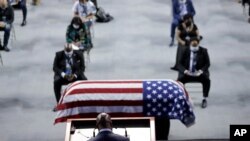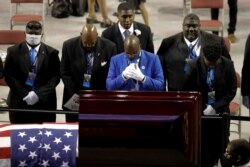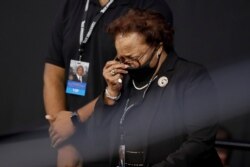John Lewis, the U.S. congressman and civil rights icon, was remembered Saturday as someone who fights for "the least of us."
Two memorial services were held Saturday in Alabama on the opening day of six days of tributes.
On Saturday at the public service at Troy University in Alabama, five siblings and a great-nephew spoke of Lewis as a loving and fearless family man.
"He'd gravitate toward the least of us," said brother Henry "Grant" Lewis. "He worked a lifetime to help others."
Brother Samuel said his mother had warned John “not to get in trouble, not to get in the way.” Samuel Lewis added that his brother did not heed their mother’s warning, saying, “We all know that John got in trouble, got in the way, but it was a good trouble.”
The Lewis siblings reminded the crowd of their brother's famous injunction to make "good trouble" — ruffling feathers when it was for a righteous cause.
Lewis had wanted to attend Troy University, in Troy, Alabama, his birthplace, but was denied admission to what was then a whites-only school.
U.S. President Donald Trump “paints them all with a broad brush and calls them thugs, but he is wrong,” he said, “They are patriots who want America to move forward to a nation of equals together.”
The six-day series of events memorializing Lewis’ life culminates this week with his funeral in the state of Georgia.
At the public service at Troy University, Lewis lay in repose as visitors paid their respects. Later Saturday, a private ceremony honored him at a chapel in Selma, Alabama, ahead of another public viewing.
On Sunday, Lewis’ body will cross the Edmund Pettus Bridge in Selma, where he and other voting rights demonstrators were beaten in 1965 on a day known as “Bloody Sunday.”
His body will be carried to Alabama’s capital, Montgomery, where Mayor Steven Reed is encouraging people to line the sidewalks on the final leg of that journey. Officials are asking the public to wear face masks and socially distance.
Alabama Governor Kay Ivey ordered flags to be flown at half-staff on Saturday and Sunday in honor of Lewis.
Lewis, who as a young boy preached to the chickens on his family’s farm, eventually earned a degree from Fisk University in religion and philosophy. Years later, Troy University bestowed a honorary doctoral degree on Lewis.
Senator Doug Jones from Alabama said the current crop of protesters “are protesting peacefully, nonviolently,” as Lewis did during the civil rights movement.
During the nearly weeklong memorial events, Lewis' body will lie in state at the Alabama State Capitol in Montgomery, the Georgia State Capitol in Atlanta and the U.S. Capitol in Washington.
U.S. House Speaker Nancy Pelosi and Senate Majority Leader Mitch McConnell announced last week that visitors could pay their respects to Lewis in the U.S. Capitol on Monday and Tuesday.
Due to the coronavirus, the public viewing will take place outside the Capitol building instead of inside in the traditional Capitol Rotunda. The lawmakers said social distancing will be “strictly enforced” and face masks will be required.
The Georgia Democrat will be the second Black lawmaker to lie in state at the Capitol, following Congressman Elijah Cummings, who died last year.
Lewis’ family said there will also be a procession through Washington this week and said members of the public will be able to pay their respects in a “socially-distant manner.”
Lewis’ funeral will be held Thursday at Atlanta’s historic Ebenezer Baptist Church, where the Rev. Martin Luther King Jr. was once the pastor. Following the service, which will be private, Lewis will be interred at South View Cemetery in Atlanta.
Lewis died last Friday at age 80, after a yearlong battle with advanced pancreatic cancer.
He rose to fame as a leader of the modern-day American civil rights movement of the 1950s and '60s. At 23, he worked closely with King and was the last surviving speaker from the August 1963 March on Washington where King gave his famous “I Have a Dream” speech.
The civil rights movement led Lewis into a career in politics. He was elected to the Atlanta City Council in 1981 and to Congress in 1986, calling the latter victory “the honor of a lifetime.” He served 17 terms in the U.S. House of Representatives from Georgia’s fifth district.







